All photos by Veckinon
I help design, build, and maintain a variety of specialized equipment used in wildlife biology experiments throughout the world. One of the things I help design and build is robotic taxidermied predatory birds. These birds are used in experiments that record and analyze the alarm calls of various different animals. Alarm calls are noises that animals make to warn each other of nearby predators. So, in essence, these experiments are designed to discern ‘animal language.’
The Experiment
Many hours before an experiment, the raptor can be set up and left in the wilderness disguised as a tree stump. The researchers can then remotely lower the stump disguise and activate the robot. The researchers use vast arrays of audio recorders placed at precise locations in the wilderness and record the responses of potential prey animals. These recorders are synchronized to GPS time signals and have ambient temperature sensors. The multiple audio signals are analyzed and using the speed of sound, and the time and location information from the recorders, the approximate location of any animal that made noise can be triangulated. So far, these experiments have been performed in Montana and New York here in the states, as well as in Scotland and parts of South America, internationally.
The Experiments typically consist of a roboticized bird, that is mounted on top of a disguised box. The box houses an Arduino microcontroller, a remote-control interface, a geared motor and all of the connectors necessary to attach the devices together. The geared motor is attached to a spool that runs a pulley system. This pulley raises and lowers a curtain that has been painted to look like a tree stump by art students at our local university and can be raised and lowered with a remote control.
Inside the box. This is typically disguised by the camouflauge curtain.
Radio transmitter and relay
The birds come from our local university biology departments freezer and are typically donated specimens who were found dead. No birds were killed to construct the robots. We worked closely with many local taxidermists, both amateur and professional (being Montana, there was no shortage of those) and indicated our needs for each bird.
I was also involved in the production of the GPS time synchronizer and sensor system for this project and to be honest, that was much more challenging than the work on the birds, although I am sure the taxidermists would disagree with me.
The Job
Recently, some of our setups were sent to Cornell to gather data from New York state. Once they returned it was discovered that one of the birds had lost its head in transport and that the Arduino was malfunctioning. My neighborhood friendly wildlife biologist buddy, Erick dropped the bird off at my house for some repairs.
Poor guy
The bird he dropped off was actually our prototype model, RoboBubo. A great horned owl and the first robo-raptor we ever created. RoboBubo was one of our simplest models, just its head moved. Being our prototype it is also admittedly a little rough around the edges, but it gets the data!
I remember before we built this model, we went to a raptor refuge located a few miles out of town called Raptors of the Rockies. This was a place where sick or injured raptors were taken to be cared for and rehabilitated. We studied the movements of real great horned owls to mimic their timing. And we got to hang out with a lot of other cool birds as well. It was a really amazing place.

Me and Jillian. One of the live birds we got to meet at the refuge! 2011
Anyway, I replaced the Arduino in the control box and re-set the head on RoboBubo and tuned up a couple of things and he was looking pretty sharp.
A short video
RoboBubo having a look around. (click to play)
arduino
Thanks for looking, I hope you enjoyed. Look me up sometime.
Best wishes,
@veckinon
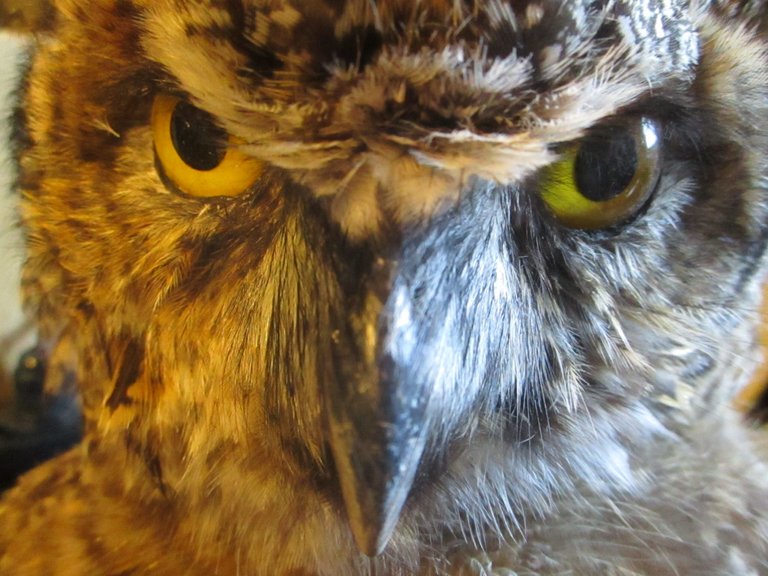
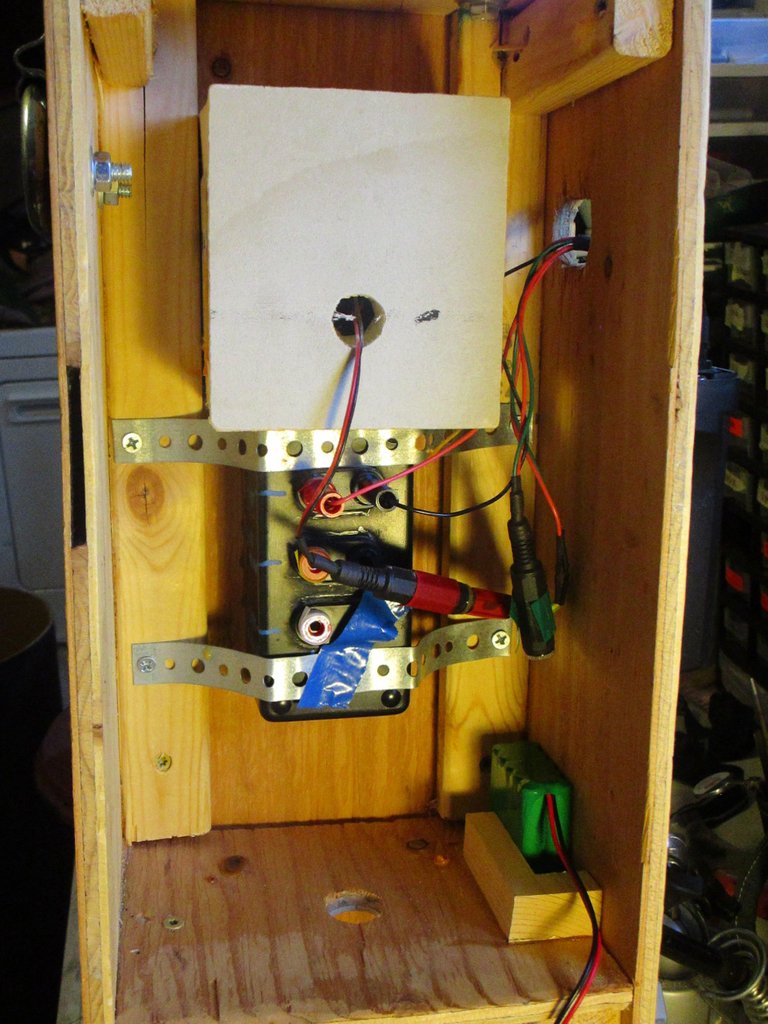
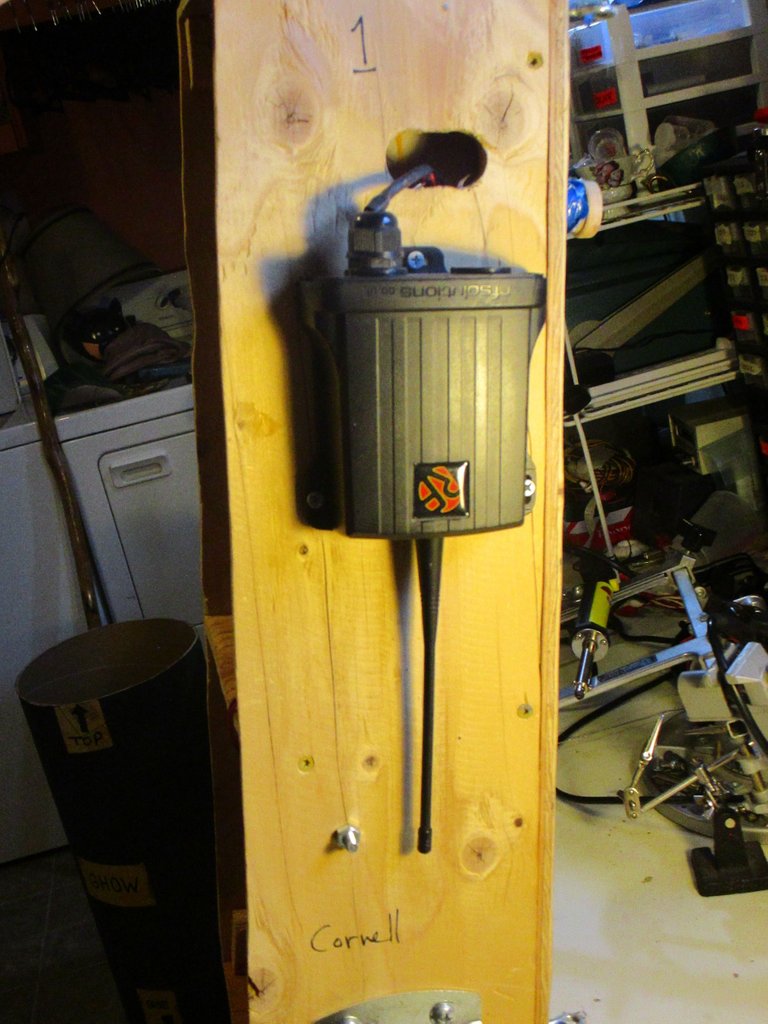
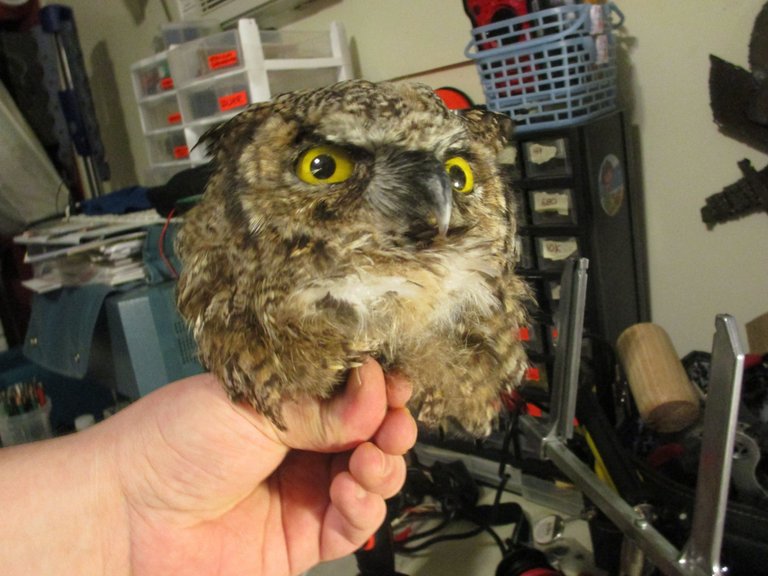
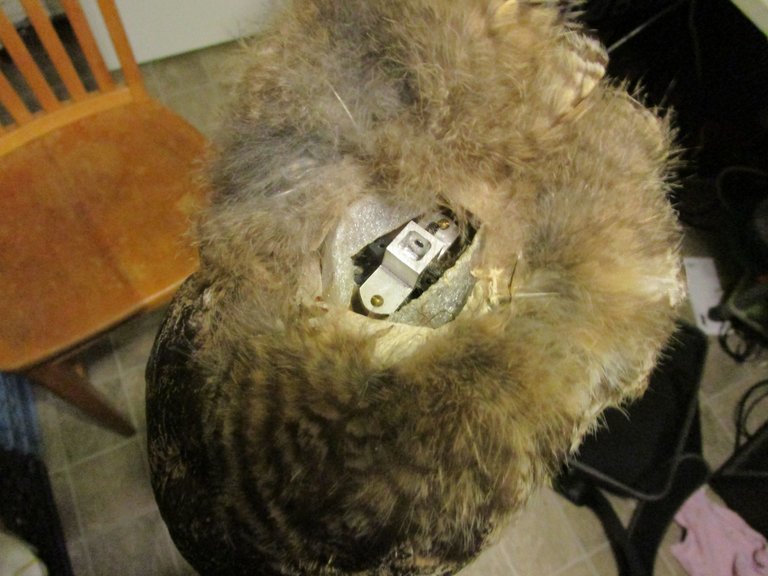
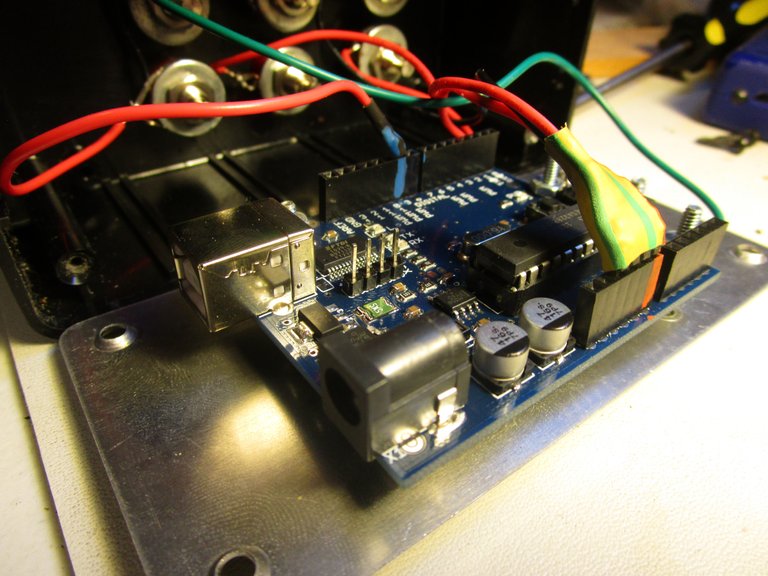
This is brilliant!
Thanks for checking it out. This project has been a blast to participate in!
Man... this post is SO COOL! Thanks for sharing about your day job.
This is really fascinating work. I'm sure the 4-leggeds and wingeds who have to worry about raptors swooping down to eat them or members of their family are keenly tuned to the presence and habits of birds of prey. When you're prey, you damn well better pay attention! But from my limited, non-prey perspective, the owl and its head movements certainly look realistic. I love that you spent time in the field researching owl behavior to inform your design.
I imagine you are up against the scarecrow phenomenon. As I understand it, birds get habituated to scare crows when they notice they never move. You've addressed that with both the accurate taxidermy and RoboBubo's head movements. It sounds like later models may incorporate other movements.
Does your experimental methodology include ways of detecting when birds have pierced the veil of your illusion? Over time, as we gain some sense of bird linguistics, perhaps we can distinguish "look out everybody, there's an owl on the prowl" from "there's that silly robot again, what do they take us for? Birdbrains?" ;-)
Haha. There actually has been some questioning about the potential of the birds realizing it is a fake and possibly creating a new call. The experiments are usually kept pretty short both to help prevent discovery and to protect the robo-raptor. Some bird are very territorially, especially when nesting, and there have been cases of other birds banding together to attack the robots to try and scare them away. This of course, can end the experiment prematurely. Here is a video with a the lead researcher on the project and a different owl and towards the end you can see a bunch of other birds flying in to intimidate a robo-owl. The video also shows a little bit more of the set-up than I have included in my article. There is actually a video of birds attacking the robo-raptor as well, but I can not seem to locate it right now.
Haha.There has been talk about the potential of animals realizing it is fake and possibly creating a new call. The experiments are usually kept short to avoid this and to protect the robo-raptor. Here is a video with the lead researcher that shows a bit more of the experiment with a different owl. Some birds are very territorial, especially when nesting and there have been cases of them banding together to try and scare off the robo-raptor. You can see this towards the end of this video. There is also a video somewhere of smaller birds attacking the roboraptors to scare them off, but I can't seem to locate it right now.
This is just flippin' awesome! Of course, I'm partial to birds, so I was drawn right into your story. What an amazing project to be such an integral part of. I couldn't stop giggling each time I tried to read 'RoboBubo'. LOL!
And what an incredible gift to meet such a stunning creature – Jillian looks like she means business. Don't cross that owl.
Thanks for offering such a rad window into something most of us will never experience first-hand. Fascinating!
I went to upvote you and saw that I already had – thanks to being on @curie's curation trail. Congrats! ;)
Yeah, I know I am smiling in the picture but I was so nervous. When I tried to get close to her to be in the photo she looked at me like, "one step closer and I will claw your face off." it took a minute for her to let me get that close. They also had other owls there as well as hawks and eagles. It was pretty amazing.
Super amazing and lovely. Wow, such talent! Loved every bit of this article and it looks like many others did too. Loved the photos, explanations and detail. Thank you for sharing. xx Eagle
Hey, thanks for checking it out. And thanks for the @eaglespirit seal of approval!
Hey you are more than welcome, this was a hit! Is that good or pretentious .. the seal? LOL
I like it!
Cool, thank you V!
Holy cow, man! This is awesome!
Hey thanks, Jakob.
Now if they could make a robot that flys (if they haven't already)
Haha. For real. That would be awesome. It turns out that such a bird is likely beyond our time and budget constraints for this project. We do have some models that shake their tail feathers though.
Lol give it some time and its possible if you all want to go through with that
Like a drone? :)
Yep remote control and everything
Wow man this is so cool! I've always wanted to do field work with my biology degree. I had a friend who used to do some work with barn owls. Maybe down the line when the kiddo moves out I'll be in better position to do something like that. Also, congrats on that curie vote!!!!! So cool :)
Thanks a lot. I wonder if your friend knows any of the people I work for? It seems like a lot of those bird scientist folks are pretty tight.
Great Original Works are rewarded by top Curators.If you like this initiative, you can follow me in SteemAuto and upvote the posts, that I upvote.
Upvoted on behalf of @thehumanbot and it's allies for writing this great original content. Do not use bid bots for at least 1-2 days, as your post may get picked up by top curators. And remember to do some charity when you are rich by contributing to me.If you have any concerns or feedback with my way of operation, raise it with @sanmi , my operator who is freaking in Steemit chat or discord most of the time.
Woohoo! Thanks @thehumanbot!
Congratulations! This post has been upvoted by SteemMakers. We are a community based project that aims to support makers and DIYers on the blockchain in every way possible. Find out more about us on our website: www.steemmakers.com.
If you like our work, please consider upvoting this comment to support the growth of our community. Thank you.
Thanks @steemmakers. You sure are swell!!
This is one of the most interesting posts I have read here on Steem blockchain in a while! So cool to hear both about the experimental uses of these robo-birds, as well as get to hear about how you fix/repair them. Loved the short video. If I was a vole I would probably be pissing my pants right about now :)
This post was nominated by a @curie curator to be featured in an upcoming Author Showcase post on the @curie blog. If you agree to be featured in this way, please reply and:
You can check out the previous week's Author Showcase to get an idea of what we are doing with these posts.
Cheers - Carl (@curie curator)
Thanks! You can use whatever text or images you would like. I sent you a message on Discord with a paragraph on the post. Thanks again and best wishes.
Author Showcase post is up :) I may have gotten a little weird on yours, but I am reasonably sure you can handle it and may in fact enjoy this sort of thing ;)
https://steemit.com/curation/@curie/curie-author-showcase-march-8th-2018
Haha. I love it. Thanks!
If Owlnet sends a liquid metal Owlinator to your door, I am sorry in advance! BTW you should leave a comment in reply to the showcase post itself, I will vote it up to the top and it is just one more way to get eyes on you :)
I am so so so so HAPPY to see you getting so much support for this work! This is so cool and amazing, and I hope lots of people get to see it! :)
Yeah, this is awesome!
🦉
Hoot-hoot
This is incredible! A flying owl would be pretty gnarly. The pray would be pretty spooked lol
Yeah, that would be sweet. It turns out that prey animals usually have different calls to indicate an owl flying over head vs an owl perched in a tree, etc. Originally they thought about doing the research with real birds and they do have some real bird data. But, real raptors are hard to come by and unpredictable.
This is awesome! Congratulations on the curie vote, totally well deserved :) You have a new follower.
Hey, thanks! It just so happens I followed you the other day too!
Oh that's funny, I didn't even notice! I must have missed the Ginabot notification (or maybe it didn't come).
Would love to see Jillian meeting RoboBubo for the first time. These type of robotic taxodermy stories always give me hope for the future of naturekind, although in a mixed kind of way.